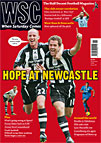 Ant, Dec and Lovejoy Cameron Carter
Ant, Dec and Lovejoy Cameron Carter
Charity is a wonderful thing, extremely versatile and nowadays used by the rich as a beautifully packaged experience gift to themselves. Last month’s Soccer Aid, raising funds for UNICEF, was a case in point. Where once upon a time charity meant an old man with skin the texture of pickled suede rattling an Oxfam tin at you, now it can be manicured primetime entertainment for all the family. A team of English celebrities and ex-players were raised to challenge their Rest of the World counterparts at Wembley and, through the week before the match, Ant and Dec loitered around the training ground of both squads to build the anticipation, chiefly through the art of synchronised sniggering.
Come the big day, Ant and Dec professionally juggled executive-box banter with the solemn presentation of films illustrating UNICEF’s work. For the unprepared spectator, seeing the cheeky pair’s serious faces following a short film on Bulgaria’s abandoned children was quite unsettling. A lot of money was raised, of course, and I realise the abandoned children don’t care where the money comes from, but is it to be the lot of ordinary people to sit at home watching celebrities living out their fantasies?
Robson Green extreme angling in the Spanish Main, Ewan McGregor’s mate bumming his way to Australia or Angus Deayton ecstatically challenging Luís Figo for possession – are we supposed to be delighted at the chance to watch? And in these times of depleted natural resources, shouldn’t we be stockpiling Hollyoaks actors such as Chris Fountain (who turned out for the England team) against the day when we finally run out of them to people reality television shows? It seems irresponsible to use them so freely.
One programme that should be all over by the time you read this is The Cup (Thursdays, BBC2), a sitcom filmed in the style of The Office and written in the style of Rentaghost. A group of over-zealous parents are depicted acting like children in their desperation to further their offspring’s careers in junior football. Splicing the narrative with interviews with the protagonists – mostly to offload the writers’ favourite lines – only illustrates how subtle The Office was and how juvenile its imitator is. The most original thing about this series was its scheduling by the BBC, placing it at 9.30 in the evening, when adults would be watching, rather than just before Newsround, where we might expect the second series to turn up.
Pressing the red button by mistake on my Freeview remote control, I was transported to the inside of a small radio studio, where Tim Lovejoy was presenting a phone-in programme for Radio 5 Live. This exciting new feature meant we actually got to see Tim slouching around in his chair (he’s actually better slouching around on his feet, if you ever watch Something For The Weekend, as being upright gives him a greater range of slouching styles), while talking half-baked rubbish with his listeners. The camera also catches the presenter frowning at the rushed, digressive gabble of the contributors heroically trying to get to the point while saying “basically” a lot.
The touch of genius Lovejoy brings to his programme is in being more subjective and intellectually erratic than his callers. In chronological order he expounded the view that people like John Terry shouldn’t be sent off, if at all possible, because the paying spectator wants to see the best players on the pitch. A couple of minutes later he felt that there is a lack of communication between referees and players and that the solution would be to mike refs up. He didn’t explain why this would be the solution, possibly realising just too late that he’d transposed the solution to another problem on to the end of his own.
Approximately 30 seconds later he was heard to interrupt a caller with the words: “Ah, but Jack Charlton didn’t tackle anybody ever, he just used to kick them in the knees.” If one was in the company of a 12-year-old who said something like this the correct action would be to wince privately and offer to buy the child a parrot if they counted to 1,000 in their head. Easily the highlight of the evening was the exchange between Lovejoy and the Man Utd caller who complained that Cristiano Ronaldo received a standing ovation when he came on for his first game of the season. Lovejoy: “But he’s one of your best players.” Caller: “He’s a good player, but he’s also a bit of a cunt.” It’s the first time many of us had witnessed Tim Lovejoy sitting up straight and paying attention.
From WSC 261 November 2008